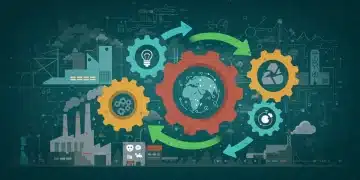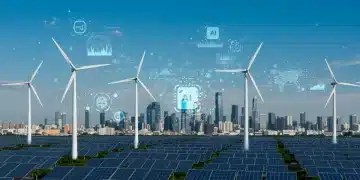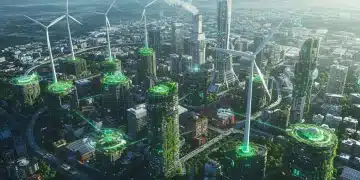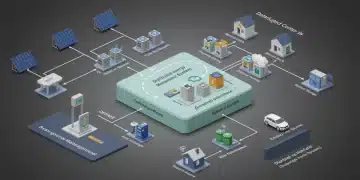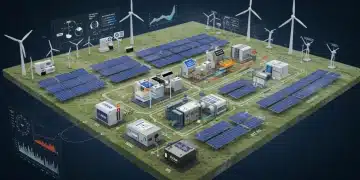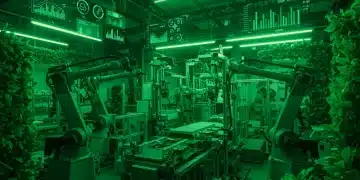2025 Green Tech Job Market: 4 High-Demand Skills Emerge
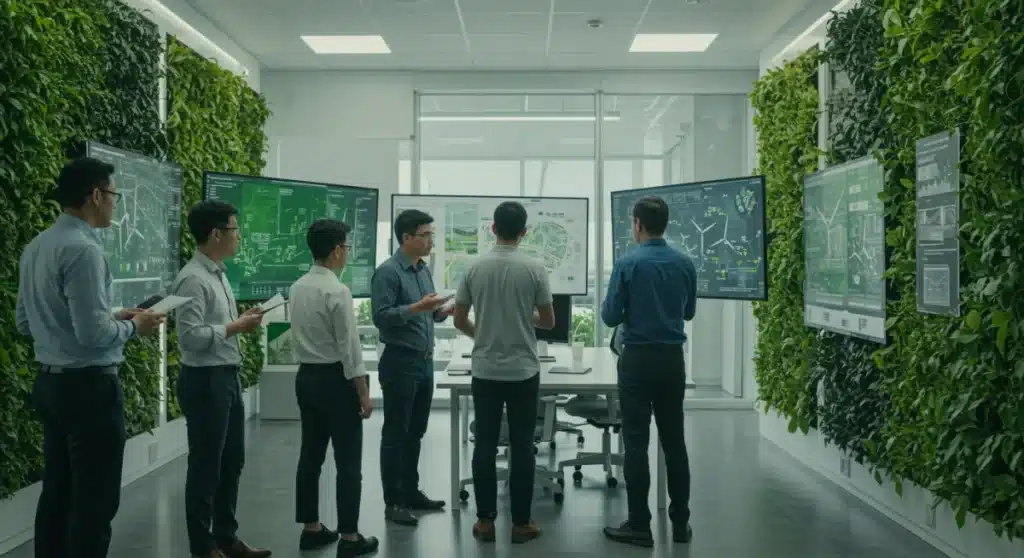
The 2025 green tech job market requires professionals to possess high-demand skills in renewable energy integration, circular economy principles, sustainable data analytics, and green project management to thrive in this rapidly evolving sector.
As of late 2024, the landscape of the 2025 Green Tech Job Market: 4 High-Demand Skills for the Next 12 Months (TIME-SENSITIVE, PRACTICAL SOLUTIONS) is rapidly taking shape, driven by urgent global sustainability goals and unprecedented investment in eco-friendly innovations. Understanding these shifts now is crucial for professionals aiming to secure their future in this burgeoning sector. What essential skills are emerging as non-negotiable for success?
The Accelerating Shift Towards Green Economies
The global push for decarbonization and sustainable development is not merely a trend; it is a fundamental economic transformation. Governments and corporations worldwide are committing trillions to green initiatives, from renewable energy infrastructure to sustainable manufacturing and waste reduction. This massive investment directly translates into a soaring demand for skilled professionals capable of designing, implementing, and managing these green technologies.
Recent reports from the International Renewable Energy Agency (IRENA) indicate that renewable energy jobs alone could reach 38 million by 2030, a significant jump from current figures. This growth is fueled by ambitious targets set by international agreements and national policies, creating a robust and expanding job market. The urgency of climate change mitigation means that companies are actively seeking talent that can deliver tangible environmental and economic benefits, making this a prime time for career transitions or upskilling.
The green sector is no longer niche; it’s becoming mainstream. Every industry, from finance to manufacturing, is integrating sustainable practices, creating a ripple effect across the job market. This integration requires a new breed of professionals who understand both traditional business operations and the specific nuances of environmental impact and sustainable solutions. The next 12 months are particularly critical for acquiring these skills, as the market is moving quickly.
Renewable Energy Integration & Smart Grid Expertise
The backbone of a green economy is its energy infrastructure. As renewable sources like solar and wind power become dominant, the ability to integrate these intermittent sources into stable, efficient grids is paramount. This involves complex engineering, data management, and a deep understanding of energy storage solutions. Experts in this field are currently among the most sought-after professionals.
Developing and maintaining smart grids requires a blend of traditional electrical engineering knowledge with advanced digital capabilities. Professionals must be adept at optimizing energy flow, predicting demand, and managing distributed energy resources. This area is seeing rapid innovation, with new technologies emerging constantly, demanding continuous learning and adaptation from its workforce.
Advanced Grid Management Technologies
The evolution of smart grids relies heavily on cutting-edge technologies that enable real-time monitoring and control. These systems are crucial for ensuring grid stability and efficiency as more renewables come online.
- Energy Storage Systems (ESS): Expertise in battery storage, pumped hydro, and other ESS is vital for balancing supply and demand from intermittent renewable sources.
- Grid Modernization: Knowledge of advanced metering infrastructure (AMI), demand-side management (DSM), and grid automation is essential for optimizing energy distribution.
- Distributed Energy Resources (DER) Integration: Skills in integrating smaller-scale renewable energy systems, such as rooftop solar and community wind projects, into the broader grid.
Circular Economy Principles & Waste Management
Beyond energy, the circular economy represents a fundamental shift in how goods are produced, consumed, and disposed of. This model aims to eliminate waste and pollution, circulate products and materials, and regenerate nature. Professionals who can implement these principles, from product design to reverse logistics, are becoming indispensable. This is not just about recycling; it’s about rethinking entire value chains.
Companies are increasingly under pressure from consumers, regulators, and investors to adopt more sustainable practices. This translates into a strong demand for individuals who can design products for longevity, facilitate material recovery, and develop innovative waste-to-resource solutions. The next year will see a significant acceleration in the adoption of circular economy strategies across various industries, creating numerous opportunities.
Designing for Sustainability
A core component of the circular economy is the emphasis on design that minimizes environmental impact from the outset. This requires a new approach to product development and material selection.
- Eco-Design Expertise: Skills in designing products for durability, repairability, and recyclability, often involving life cycle assessments (LCA).
- Material Science Innovation: Knowledge of sustainable materials, bioplastics, and advanced recycling technologies to keep resources in use for longer.
- Reverse Logistics & Supply Chain Optimization: Ability to manage the return and reprocessing of products and materials efficiently, reducing waste and maximizing resource value.
Sustainable Data Analytics & AI for Environmental Impact
Data is the new oil, and in the green tech sector, it’s the fuel for informed decision-making and optimized sustainability efforts. Professionals skilled in collecting, analyzing, and interpreting environmental data, often leveraging artificial intelligence (AI) and machine learning (ML), are in high demand. This includes everything from monitoring carbon emissions to predicting renewable energy output and optimizing resource use.
The ability to translate complex environmental data into actionable insights is critical for businesses seeking to reduce their footprint, comply with regulations, and achieve their sustainability goals. AI and ML are transforming how we understand and manage environmental challenges, making data scientists with a green focus incredibly valuable. This intersection of technology and sustainability is a rapidly expanding area, offering significant career prospects.
Companies are increasingly relying on data to track their environmental performance, identify areas for improvement, and report on their sustainability metrics. This necessitates experts who can not only manage large datasets but also apply advanced analytical techniques to extract meaningful information. The demand for these skills will only grow as environmental regulations become stricter and corporate sustainability commitments deepen.
Green Building & Infrastructure Development
The construction sector is a major contributor to global emissions and resource consumption. Consequently, there’s a huge push towards green building practices and sustainable infrastructure development. Professionals with expertise in LEED certification, sustainable materials, energy-efficient building design, and resilient infrastructure are essential for transforming urban landscapes and rural developments alike.
This skill set involves understanding green building codes, implementing renewable energy solutions within structures, and designing for water efficiency and waste reduction. As cities worldwide aim for carbon neutrality and resilience against climate impacts, the demand for green building specialists is surging. This is a practical, hands-on field with significant immediate impact on environmental sustainability.
Key Areas in Sustainable Construction
Sustainable construction encompasses a broad range of practices and technologies aimed at minimizing environmental impacts while maximizing resource efficiency.
- LEED & BREEAM Certification: Expertise in achieving and managing certifications for green buildings, ensuring adherence to high environmental standards.
- Sustainable Material Sourcing: Knowledge of eco-friendly building materials, their life cycles, and their impact on indoor air quality and energy performance.
- Energy-Efficient Design: Skills in passive design strategies, optimized HVAC systems, and on-site renewable energy generation for buildings.
Environmental Policy & Regulatory Compliance
Navigating the complex web of environmental regulations and policies is a critical skill in the green tech sector. As governments introduce new legislation to combat climate change and promote sustainability, businesses need experts who can ensure compliance, understand policy implications, and even contribute to policy development. This role often bridges the gap between scientific innovation and legal frameworks.
Professionals in environmental policy and compliance are responsible for interpreting regulations, conducting environmental impact assessments, and developing strategies to meet or exceed legal requirements. Their work is crucial for mitigating risks, avoiding penalties, and ensuring that green projects are implemented smoothly and ethically. The evolving nature of climate policy means this is a dynamic and constantly relevant field.
This area requires a strong understanding of both environmental science and legal principles, along with excellent communication skills to liaise with regulatory bodies, stakeholders, and internal teams. As companies expand their global footprints, knowledge of international environmental standards and agreements also becomes increasingly important, making this a highly specialized and valuable skill set for the coming year.
Project Management in Sustainable Development
Executing green tech initiatives, whether it’s building a solar farm or implementing a circular economy strategy, requires specialized project management skills. These projects often involve unique challenges, such as navigating complex regulatory landscapes, integrating diverse technologies, and managing stakeholder expectations across environmental, social, and economic dimensions. Effective leadership is key to success.
Green project managers must possess a holistic understanding of sustainability principles, alongside traditional project management methodologies. They need to be adept at risk assessment, resource allocation, and team coordination, all while keeping environmental and social impacts at the forefront. The growing number and scale of green projects mean that demand for these specialized managers will continue to escalate significantly over the next 12 months.
Certification in green project management, such as the PMP with a focus on sustainability, is becoming increasingly valuable. These professionals are not just delivering projects on time and within budget; they are ensuring that those projects contribute positively to environmental and social goals, making them instrumental in the successful transition to a sustainable future.
| Key Skill Area | Brief Description |
|---|---|
| Renewable Energy Integration | Expertise in connecting intermittent renewable sources to stable, efficient energy grids, including smart grid management. |
| Circular Economy Principles | Ability to implement waste reduction, material circulation, and regenerative design across product lifecycles. |
| Sustainable Data Analytics | Proficiency in using data, AI, and ML to monitor environmental impact, optimize resource use, and inform sustainability strategies. |
| Green Project Management | Specialized skills for leading sustainable development projects, ensuring environmental, social, and economic goals are met. |
Frequently Asked Questions About Green Tech Jobs
The primary driver is the global commitment to decarbonization and sustainable development, backed by significant government and corporate investments in renewable energy, eco-friendly infrastructure, and circular economy initiatives.
Yes, while some skills are more concentrated in specific areas like energy or waste, their underlying principles of sustainability, data analysis, and project management are broadly applicable across the entire green tech spectrum.
Given the rapid pace of development and investment, the next 12 months are crucial. Proactive upskilling and reskilling now will position professionals advantageously for the emerging opportunities in 2025 and beyond.
Numerous online platforms, universities, and industry associations offer specialized courses and certifications in renewable energy, sustainable design, data analytics for sustainability, and green project management. Researching reputable programs is key.
While many roles in green tech benefit from STEM backgrounds, there’s also growing demand for professionals in policy, finance, marketing, and project management who possess a strong understanding of sustainability principles and green technologies.
What Happens Next
The trajectory of the green tech job market in 2025 is clear: demand for specialized skills will intensify. As of this report, the critical window for professionals to acquire or refine these competencies is now. Expect continued policy support, increased private sector investment, and rapid technological advancements to further shape this landscape. Those who adapt swiftly to these evolving requirements will be best positioned to lead the charge in building a sustainable future. Keep an eye on new governmental incentives and corporate sustainability reports, as these will continue to signal key areas of growth and opportunity.
